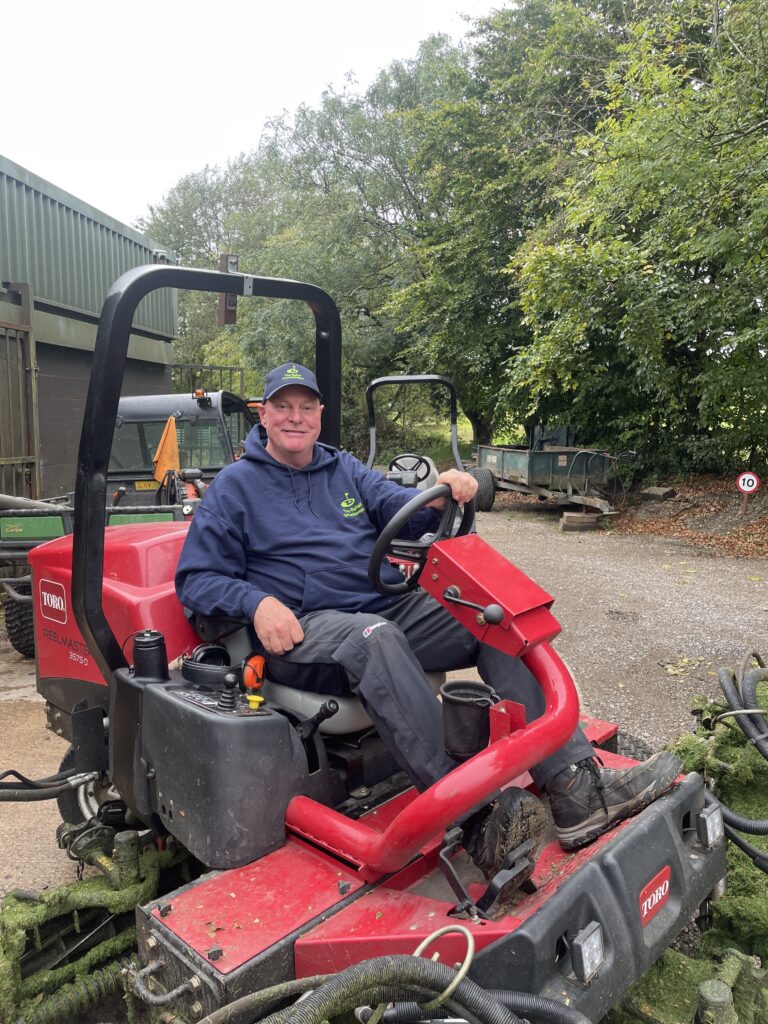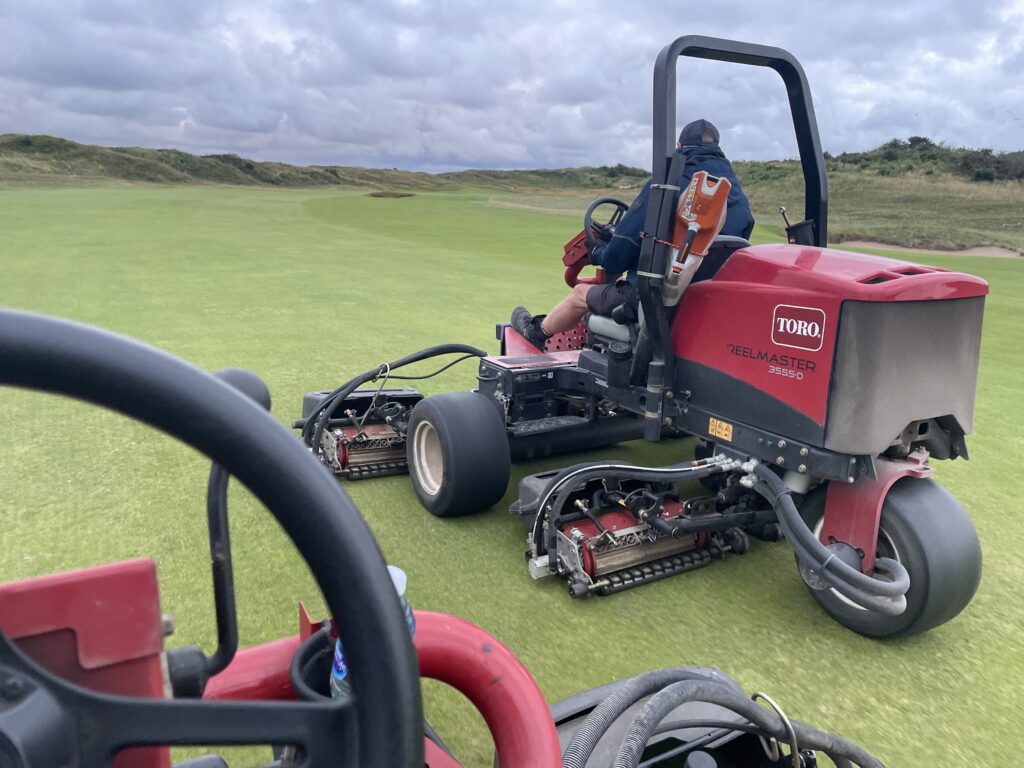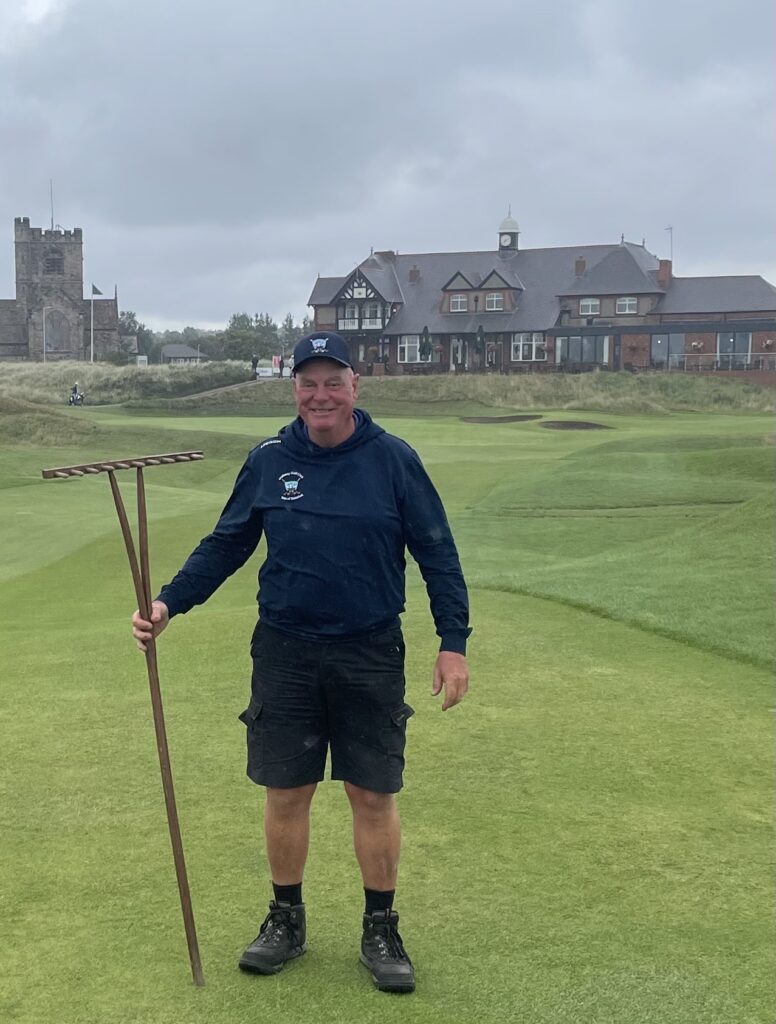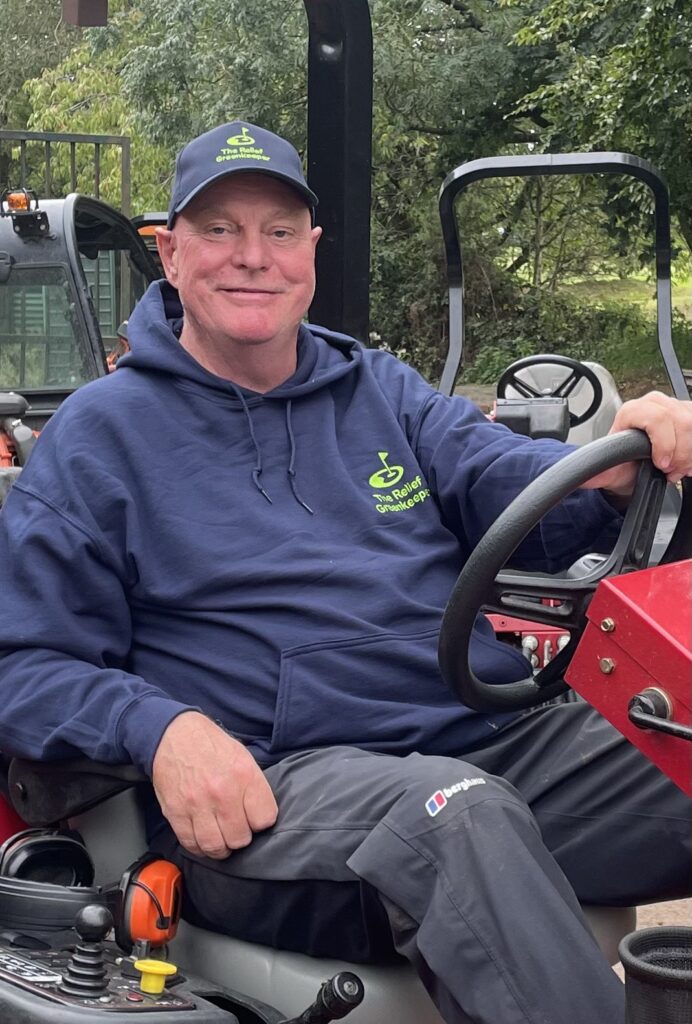Welcome to the latest edition of our “Meet the Members” series, where we highlight the people making a difference in the greenkeeping industry. Today, we’re joined by Duncan Cheslett, better known in the golf world as The Relief Greenkeeper, who has built a reputation across social media for his skilled, flexible work on golf courses.

Q: Tell us a bit about yourself, Duncan.
Hi, I’m Duncan, and I’m based in Stockport near Manchester. I started greenkeeping quite late—I didn’t turn to it until I was 60. Before that, I spent 40 years as a self-employed cabinet maker. During COVID, I found that business was increasingly difficult, so I started looking for something new. That’s when I saw an advert for work in the golf industry, reached out, and the rest is history. I started greenkeeping the very next day and loved it immediately.
Q: How did you end up going freelance instead of working full-time at a course?
It was partly a pay issue. I had a disagreement with a club over wages, which prompted me to leave, and I spent a few months working indoors at a factory over the winter. During that time, I planned my freelance career. I now work across multiple courses, which keeps things interesting and also allows me to earn more than I would as a full-time employee.

Q: What kinds of tasks do you usually handle?
Most clubs hire me for general mowing duties, so fairways, roughs, and greens. I’m not usually called in for intricate work like bunker maintenance or delicate surrounds as those require intimate knowledge of the course and are best left to permanent staff. I find learning the layout and figuring out each course’s quirks is part of the challenge and fun of the job.
Q: What do you enjoy most about working across different courses?
I love the variety. Every course is different, every team has a different dynamic, and I’m someone who loves constant change. I think meeting new people and learning new layouts keeps the job exciting. I prefer moving around and spreading my skills across different locations.

Q: How does freelance greenkeeping work financially for clubs?
Hiring a freelance greenkeeper can actually be more cost-effective for a club than employing someone full-time. For example, a full-time staff member might cost a club £22 an hour once you factor in employer contributions, holiday pay, and so on, while the employee only receives £12 per hour. Let’s say I charge £20 an hour, but clubs only pay for the days I work, and there’s no long-term commitment.
Q: What’s it like working as a freelance greenkeeper in all types of weather?
Rainy days can be tough. I know some people might see it as a perk, but personally, I’d much rather stay at home. There have been days when I’ve preferred not to get paid and just stay at home. The flexibility is a big part of freelancing. If I’m booked for a couple of days and it’s absolutely tipping it down, I simply don’t go in. I’m fortunate enough not to be reliant on the income, so I can make that choice. Going out mowing fairways all day in the rain isn’t enjoyable for anyone.

Q: What has been the most challenging experience for you so far?
Honestly, there aren’t many dramatic moments, but there are the usual learning curves. For instance, sometimes you can’t see the edge of a fairway properly. You do your best, and then realize you’ve been mowing off-line for a couple of hundred yards. It’s frustrating, but I’ve found that you just need to fess up. You can’t hide mistakes, and admitting them usually gets the same response: “Don’t worry. Grass grows.”
Q: Is there a growing demand for relief greenkeepers like yourself?
Absolutely, though be careful with the term “Relief Greenkeeper”—it’s trademarked! There’s a clear demand for the type of service I provide. Clubs need skilled, temporary staff for short-term gaps, and I’ve proven it works in my local area. My next step is to build a small team of like-minded people who can be placed at golf clubs around the country.
Q: What qualities would you look for in someone joining your team?
Reliability is really important. They need to handle basic tasks competently without constantly asking for guidance. They should be confident, personable, and able to fit in wherever they go. This role is going to suit people looking for flexible, short-term work, like retired greenkeepers or experienced staff who want to scale back responsibility but still enjoy being on a mower for a couple of days a week.

Q: Have you noticed much difference between how clubs operate, especially in different regions?
Not really in terms of regions as my work has been mostly in the northwest, around Manchester, but there’s a huge cultural difference between clubs. Every head greenkeeper has their own way of doing things. Some might be “accidental heads,” the kind who started off as a junior mowing grass and ended up in the top job without a career plan. Others are highly professional and ambitious, and have followed a clear career path from apprenticeship to degrees and beyond.
Q: Does that make a difference to your work?
Absolutely. The culture at two clubs just a few miles apart can be completely different. One isn’t necessarily better than the other; they’re just suited to different types of courses and people. It’s interesting to see how each head greenkeeper’s experience and style shapes the way the team operates.

Q: What’s been one of your most enjoyable experiences this year?
Working across different types of golf courses has been fantastic. One week, I ran a small nine-hole course near Rochdale all on my own because their single greenkeeper was away. Making all the decisions yourself was challenging, but I loved it. It’s a different type of work than being part of a larger team, but it’s hugely educational and satisfying.
Q: Do you find yourself giving advice or changing the way clubs operate?
Not really. I avoid imposing my way on them. Even if I notice a more efficient way of cutting fairways, I don’t step in. It’s their course, and their experience counts. My role is to help, not to instruct, unless asked. It’s about respecting the systems they’ve developed over the years.
Q: What has been your favorite course to work on so far?
Funnily enough, it’s a toss-up between the most prestigious and the most unknown course. The unknown one is the nine-hole course near Rochdale where I worked solo for a week—absolutely loved it. The other is Wallasey Golf Club, helping them host the English Amateur. Totally different experiences, but both equally enjoyable. Diametric opposites, really, but both were highlights of my year.

Q: What’s one thing you couldn’t live without while doing your job?
The obvious answer is a car to get there, but if we’re talking kit, it’s my rainproof jacket and trousers. I invested in a £250 jacket from a hiking store, and it’s the best money I’ve ever spent. It keeps me dry and comfortable, and makes such a difference at the end of a wet day. I also have a pair of waterproof winter mittens for walking down the fairway, which make a huge difference and cost virtually nothing.
Q: What’s the best thing about being The Relief Greenkeeper?
It’s doing a job I love in a way I love: being in control of my own diary. I choose when and where to work, and I can flex my schedule around other things, like playing golf. There’s no single boss, and the freedom is fantastic. I can work a few hours in the morning and still enjoy the rest of the day.
Q: What’s your go-to snack for a tea break?
My favorite is a simple tin of taco beans with a sachet of Mexican rice. Microwave both, job done. Perfect for a mid-morning meal.

Q: If you could work anywhere as a dream job, where would it be?
I’m a big fan of links courses and I’m a member at Silloth (On Solway Golf Club) in Cumbria, so it would have to be a links course. The ultimate goal would be mowing the Himalayas at St. Andrews.
Q: Anything else you want to add?
Just that it’s been great chatting and sharing my story. For anyone interested in doing similar work or a golf club looking for support, definitely reach out. I’m building the network slowly and organically, starting locally and growing outwards.
Q: Where can people find you?
On Facebook, I’m The Relief Greenkeeper. I’m in the process of building a website, www.thereliefgreenkeeper.co.uk, which will cover services for golf clubs and support for greenkeepers.
